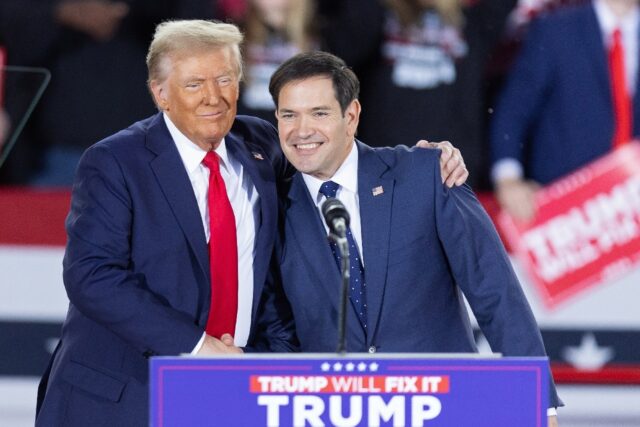Latin America can expect closer scrutiny from US President-elect Donald Trump’s pick for secretary of state, Marco Rubio, expected to take a tougher approach towards the leftist governments of Venezuela, Nicaragua and Cuba, analysts say.
Highly critical of communism and the left at-large, Rubio will likely seek closer ties to the libertarian governments of Nayib Bukele in El Salvador and Javier Milei of Argentina instead.
He would be the first Hispanic US secretary of state if his appointment is confirmed by the Senate.
And while trade with China and the wars in Ukraine and the Middle East are likely to top the Trump administration’s foreign agenda, analysts expect Rubio will pay much closer attention to America’s southern neighbors than his predecessors.
The Spanish-speaking Florida-born senator, 53, constructed his political career with the backing of anti-Castro and anti-Chavez immigrants who moved to the United States to escape economic collapse and political repression.
A surge in support among Hispanic voters is credited with helping Trump win the November 5 election over Democrat Kamala Harris.
The government in communist Cuba has not reacted to Trump’s pick of Rubio, but there is worry on the streets of Havana.
“Marco Rubio has always been against us,” said musician Ivan Jardines, 59 — who like many other Cubans blame the island’s economic woes on crushing sanctions from Washington.
Cuban analyst Arturo Lopez-Levy, who works at the University of Denver, told AFP Rubio’s nomination signaled “the perfect storm” for a Cuba facing its worst economic crisis in three decades, with shortages of food, medicine, fuel and electricity.
Analysts say the Covid-19 pandemic, which tanked tourism, as well as economic mismanagement by the government, have contributed to the dire state of the economy today.
‘Rhetoric and extremist speech’
Rubio’s parents left Cuba for the United States three years before Fidel Castro took power in 1959 but he has long been a vociferous opponent of Latin American leftists, previously claiming his parents fled Castro’s regime.
As senator, he was seen as influential in Trump’s approach to the region in his first term, which saw a tightening of US sanctions in place against Cuba since 1962.
After a brief period of US-Cuban detente under Barack Obama, Trump also placed Havana back on a list of “state sponsors of terrorism.”
If the incoming Trump administration is as hostile as the first one, Lopez-Levy expects the government in Havana will “make life more difficult for internal dissenters” while using America’s “rhetoric and extremist speech” to portray itself as a victim.
Hundreds remain imprisoned in Cuba for taking part in historic anti-government demonstrations in July 2021.
Also in Rubio’s sights will be Venezuela’s Nicolas Maduro, who has clung to power despite the opposition claiming victory in July elections, and Nicaragua’s Daniel Ortega — accused of leading a vicious crackdown on dissent.
“They will be pressured by Washington to produce some regime change,” said Argentine political analyst Rosendo Fraga.
The Venezuelan opposition led by Maria Corina Machado and Edmundo Gonzalez rushed to congratulate Trump on his election victory, vowing to be a “reliable” ally in Maduro’s sted.
But the last time the US and dozens of other countries refused to accept Maduro’s election victory, in 2018, that did nothing to budge his hold on power in the country with the world’s largest proven oil reserves.
More than seven million Venezuelans have left the country as GDP dropped 80 percent in 10 years amid economic mismanagement and, later, US sanctions.
Many of the fleeing Venezuelans have arrived in the United States, whose elections Trump won in part by promising further clampdowns immigration.
Chinese influence
China hawk Rubio has also been a vocal critic of Beijing’s expanding presence in Latin America through infrastructure projects, investment, aid and military cooperation.
But, ironically, tougher sanctions against Venezuela and Cuba will likely “favor a greater Chinese and Russian influence” in the region, said Christopher Sabatini, Latin America researcher at Chatham House.
Beijing is an ally of Western pariah Moscow, engaged in an invasion of Ukraine.
As for Mexico, the incoming administration had signaled an antagonistic approach, with Trump vowing to impose tariffs of at least 25 percent on goods coming from the US neighbor unless it stops what he called “onslaught of criminals and drugs” crossing the border.
In the rest of the region, the center-left governments of Brazil, Colombia and Chile “will be further away from Washington” under Trump than they were with Biden, said Fraga.
The natural allies of the incoming administration will be Bukele and Milei — the first leader of the region to meet Trump after his victory.
Milei and Rubio met in Buenos Aires in February.
Biden officials have gently voiced concern about rights in El Salvador under Bukele, who has been embraced by Trump supporters for his relentless assault on crime.

COMMENTS
Please let us know if you're having issues with commenting.